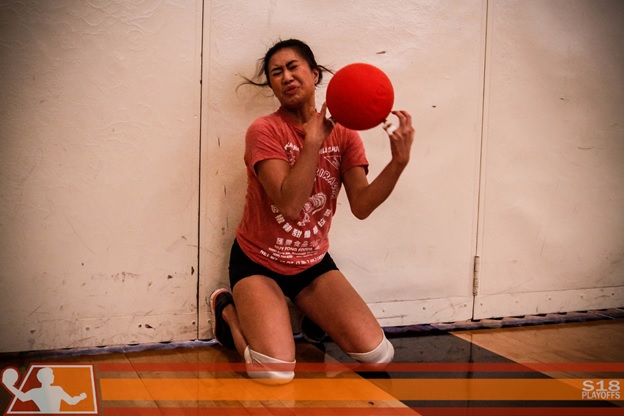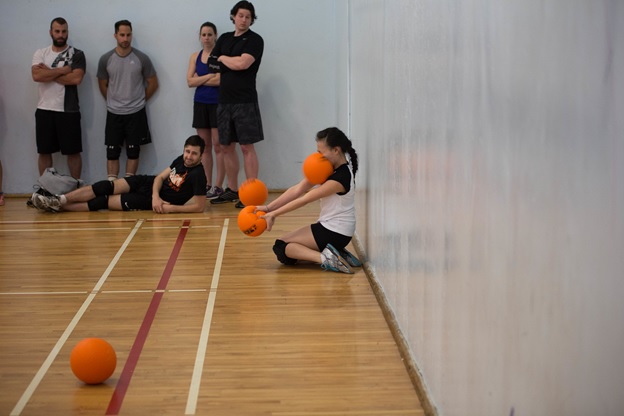
Concussions are an issue that affects all sports and it is important that everyone in the dodgeball community recognizes the signs and symptoms, so they can remove any player with clear or suspected symptoms. Head injuries can happen from a ball, contact with another player, or contact with the ground or wall.
VDL has implemented a new tool to help create a safer environment on the courts. All the ball bags in the gyms have been equipped with a Concussion Recognition Information Card which includes signs and symptoms of concussions, questions to ask someone who has suffered a head injury, and procedures to follow for these types of injuries. These cards are also used by larger sporting organizations such as the International Rugby Board, IIHF, FIFA, and the Olympics.
What exactly is a concussion?
A concussion is a traumatic brain injury that alters the way your brain functions. Effects are usually temporary but can include headaches and problems with concentration, memory, balance and coordination.
Visible clues of a suspected concussion
- Unsteady on feet/balance problems or falling over
- Grabbing/clutching of head
- Lying motionless on ground/slow to get up
- Confused/not aware of plays or events
Symptoms of a suspected concussion
|
|
Questions to ask a teammate with a suspected concussion
- “What day is it?”
- “What gym are we at today?”
- “Which team did you play last game?”
- “Which team won the last game?”
- Concentration: recite three digits to your teammate and ask the individual to recite them backwards.
The above examples are not a formal test for diagnosing a concussion. Rather, this is to help bring awareness to you and your teammates that he or she may have sustained a brain injury.
Any player with a suspected concussion should be IMMEDIATELY REMOVED FROM PLAY, and should not be returned to activity until they are assessed by a healthcare professional. Athletes with a suspected concussion should not be left alone and should not drive a motor vehicle.
Carolyn Tam, physiotherapist and veteran dodgeballer, wrote an informative article about concussions. To read more, click here.
Some latest information about concussions:
- Concussions can occur from a single or multiple blows to the head. Repetitive trauma (such as boxing) is thought to be the most damaging to the brain.
- A 2015 study at UBC found that head injuries can cause damage to the nerves in the brain, particularly the myelin sheath (which acts like the insulation on a wire). It can take up to 2 months for the nerves to recover.
- Following a head injury, there could be damage to the brain even if the person is asymptomatic.
- A person who has had a symptomatic concussion is more susceptible to have symptoms the next time an incident occurs.
- A study on NHL players found that recovery time more than doubles with each successive concussion (CMAJ, 2011).
- Loss of consciousness, being knocked out, only occurs in 10% of concussions.
- A combination of vestibular (balance) and cervical spine rehabilitation may facilitate recovery in individuals with persistent dizziness, neck pain and/or headaches following sport-related concussion. (BJSM, 2014)
- More research is needed to better understand the long-term effects of concussions.

Ultimately, the responsibility to reduce headshots on the dodgeball court is held with the players. The onus is on each person to keep their throws low and to not purposefully aim at someone’s head. It is common courtesy to apologize if you accidently hit another player in the head.
Whether you are a seasoned athlete or an average Joe, you need to properly address and rehabilitate your concussion appropriately. Health care professionals believe that earlier treatment and active therapies can reduce or eliminate concussions’ long term consequences. As with any other injured body part, the brain responds better to proper and prompt treatment.

Dr. Nathan Ng is a Chiropractor practicing in Burnaby. He completed his Chiropractic education at the University of Western States in Portland, Oregon after graduating from UBC with a Bachelors of Human Kinetics. He provides care for all parts of the body and has a special interest in sports injuries. Nathan has been a member of the dodgeball community since season 8 of VDL. Email nathanngchiro@gmail.com for questions or to suggest more article topics. Find out more about Dr. Nathan at nathanngchiro.com.
